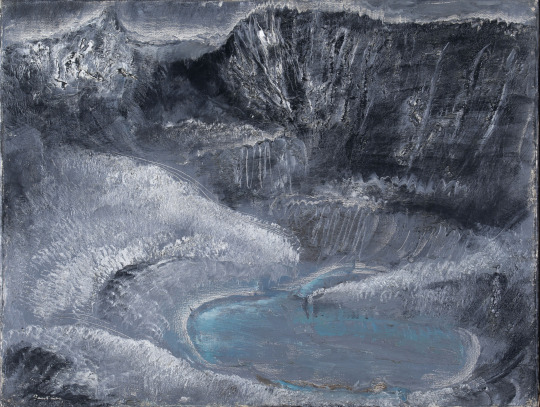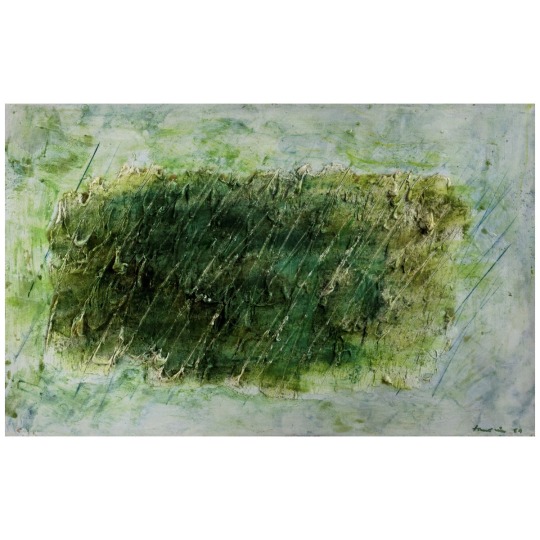#Jean Fautrier
Explore tagged Tumblr posts
Photo

Jean FAUTRIER Blue Lake I
352 notes
·
View notes
Text

Jean Fautrier, Tête d‘Otage no. 20, 1944, oil on paper on canvas, Cologne, private collection. Photo from August 2024 taken in the Exhibition "Jean Fautrier. Genie und Rebell" at Emil-Schumacher-Museum in Hagen, Germany.
32 notes
·
View notes
Text

Jean Fautrier (French, 1898-1964) - La Mort du Sanglier (The Death of the Boar) (1927)
316 notes
·
View notes
Text




Jean Fautrier (1898-1964): He was one of the major representatives of the informalism movement. Informalism focuses on shape, matter painting (impasto), the dialogue between the subject and the canvas. The nature of the canvas--the intimate, primeval taste of the materials. Touch, intention, entering the "space of the painting". Similarly to action painting (see Jackson Pollock), the canvas opens itself to the artist and the viewer alike, usually coming in a rather big format.
Dépouille (1946)
Hostage Head (1943)
Hostage Head (1944)
I couldn't find the specific name of this piece, sorry :' )
Fautrier was heavily inspired by the atmospheric paintings of William Turner (1775-1851), before his ultimate abandonment of shape. The amorphous objects that appear in the paintings I chose are a reflection of humanity in the state of the war, what's left of a man after so much destruction. In Dépouille and Hostage Head, the body devolves into an embryo, immersed once again in a space of fluidity. Everything is matter, everything in this world is made of the same intrinsic substance. Fautrier offers a reflection on the brutal regression society, and humanity itself, must have been subjected to in order to achieve such violence as the one brought by the second world conflict.

William Turner - Snow Storm (1842)

him
[[this one I actually study it in school. Like, during the last semester of my 3rd year of uni, but ok]]
#another copy of a post I made for Art History Academy#art#jean fautrier#painting#french painter#informalism#art history#second world war#william turner
9 notes
·
View notes
Text

Art.
Jean Fautrier, Rain, 1959.
63 notes
·
View notes
Text

"VASE DE GIROFLÉES" JEAN FAUTRIER // 1925 [oil on canvas | 55 x 46 cm.]
37 notes
·
View notes
Text

Jean Fautrier - Flowers (1928)
#art#arte#arts#painting#modern art#arte moderna#canvas#arte contemporanea#contemporary art#modern#Jean Fautrier
33 notes
·
View notes
Text

Jean Fautrier (French, 1898-1964)
Sans Titre (untitled) - oil on canvas - 1926
18 notes
·
View notes
Photo

Jean Fautrier (1898-1964) Surfaces de couleurs, tableau à 4 cotés,1958. - source Bonhams.
24 notes
·
View notes
Text

Jean Fautrier in der Niebuhrstraße
Es ist schwierig zu unterscheiden, zwischen den inneren Bildern und den Bildern, die man in seinem Leben gesehen hat. Es gibt immer wieder die Vorstellung, unmögliche Bilder zu malen. Bilder sind vollkommen stumm und lassen sich nicht auf Worte zurückführen.
4 notes
·
View notes
Text


It‘s been more than a month since I visited the exhibition „Jean Fautrier - Genie und Rebell“ at Emil Schumacher Museum in Hagen, Germany, and hence the recently published catalogue comes in handy to freshen up my memories. The exhibition presents a great array of works from different work phases, also including the sculptures Fautrier produced during the 1950s. They also are the subject of the preliminary catalogue raisonné included in the catalogue, compiled and knowledgeably elucidated by Katja Blomberg. But the anchor point of the catalogue undoubtedly is Siegfried Gohr‘s long essay that serves as a bracket around the exhibition and analyzes as well as contextualizes Fautrier’s work. Along the exhibited works he leads the reader through the artist‘s life and career. What becomes clear is the singular vision Fautrier followed and gradually realized: a new type of painting in which the colors take on a relief-like quality. Fautrier put them to the test by means of a limited quantity of motifs, a strategy that is rooted in his idiosyncratic realism of using only motifs surrounding him. Consequently, the painting materials took precedence over potential motif effects. In keeping with the exhibition’s emphases the catalogue also devotes considerable space to Fautrier’s 1950s „originaux multiples“ with which he anticipated the multiples of the 1960s. In two essays Dirk Volmer and Dieter Schwarz shed light on this somewhat neglected part of his oeuvre that the Hagen exhibition finally shows in its entirety. Based on a production process developed by his partner Jeannine Aeply, who initially focused on the high-quality reproduction of Fautrier’s illustrations in books as well as other artists’ works, Fautrier produced beautiful multiples that unfortunately weren’t a financial success. Accordingly their production was stopped by the mid 1950s. With the present catalogue the editors provide a perfect supplement for the exhibition at ESMH that very knowledgeably contextualizes and explains the impressions gained. Highly recommended, especially since it is a bilingual edition!
#jean fautrier#art informel#informel#abstract art#french art#exhibition catalogue#modern art#art history#art book
15 notes
·
View notes
Text

Jean Fautrier (French, 1898-1964) - Portrait de Ma Concierge (1922)
161 notes
·
View notes



